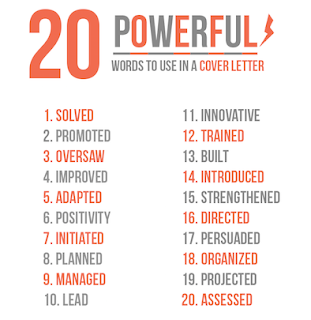In May Microsoft published an interesting study
detailing research on the changes in our attention spans over the last
several years. From 2000 to 2013 our attention spans dropped from 12
seconds to a mere eight seconds. We now have an attention span 1 second shorter than that of a goldfish.
Let that sink in for a minute … Which makes me
wonder … What effect does dwindling attention span have on our job
searches—and our cover letters? It means the cover letter as we know it
is dead.
HOW WE WRITE COVER LETTERS NOW
- Super text-dense, making up one full page—sometimes more—in content.
- A long-winded introduction that doesn’t add value to the candidate but merely states where you heard about the position and why you may be interested.
- A lengthy body of text consisting of 2-3 paragraphs—that typically either repeats points in the resume or tries to make a connection between experience and the position to which you’re applying.
- A long closing paragraph—which may or may not include a follow-up method or contact information.
- Some people get carried away and delve into a long career narrative or life story.
HOW WE NEED TO WRITE COVER LETTERS – Also referred to as an E-Note, Power Note, Pain Letter or Value Proposition Letter.
Instead of just repeating yourself (“I was in charge of reviewing
invoice disputes”), use your cover letter to describe additional details
that you weren’t able to squeeze onto the single page of your resume:
“By resolving invoice disputes, I gained a deep analytical knowledge—but
more importantly, I learned how to interact calmly and diplomatically
with angry customers.” A cover letter gives you the freedom to use full
sentences—instead of bullet points—so use them to expand upon your
resume points and tell the story of why you’re the perfect fit for the
company.
Remember to keep each point short!
“Next time you sit down to write a cover letter, vow to not get uptight about all the tiny little ‘rules’ you’ve picked up along the way.”. Instead, buck convention. Be memorable. Nail the stuff that will make you a true standout.”
1. Don’t Regurgitate Your Resume
2. Think Not What the Company Can Do for You
A
common cover letter mistake? Talking about how great the position would
be for you and your resume. Frankly, hiring managers are aware of
that—what they really want to know is what you’re going to bring to the
position and company. On that note:
3. Clearly Show What You’re Capable Of
Beyond
explaining what you’ve done in the past, show hiring managers what you
can do in the future. “Determine the key requirements and priorities for
this job, and make it instantly clear to the reviewer that you can
deliver the goods on these key things.”
“Consider crafting a section within the letter that begins with,
‘Here’s what, specifically, I can deliver in this role.’ And then
expound upon your strengths in a few of the priority requirements for
that role.”
4. Tell a Story
What
brings you to this company? Did you used to sing along to all of its
commercials as a kid? Did the product make some incredible difference in
your life? Do you sometimes pull into the parking lot and daydream
about what it would feel like to work there? Stories bring your
background and experiences to life, so feel free to tell them. (Just,
you know, keep them short and to the point.)
5. Use a Few Numbers
When
it comes to the job search, numbers often speak louder than words.
“Offer stats to illustrate your impact on companies or associations
you’ve worked for in the past.”
“Employers love to see numbers—it shows them that you speak their
language and that you understand what they’re looking for in an
employee: results.”
6. Be Real
“Honest,
genuine writing always goes much, much further than sticking to every
dumb rule you’ve ever read in stale, outdated career guides and college
textbooks,”
7. Cut the Fluff
Avoid, at all costs, describing yourself as a “team player” or a “people person.”
“Instead, show off your skills with descriptive statements like ‘I’m an
expert communicator with experience bringing together diverse
departments to develop a cohesive program.’ It’s longer—but it’s also
stronger.”
A Formula to Follow
Use the following point to keep your e-note creation easy. You won’t
have to start from scratch every time you write a new one, and writing
will be easier and faster.
Remember to keep each point short!
- Engage or fascinate
- Target the need
- You are the solution
- Prove it!
- Money – Employers want to know how you made it, saved it, or contributed to it
- Brand – Make the connection
- Close with a call to action
- Edit – 150 words or fewer
“Next time you sit down to write a cover letter, vow to not get uptight about all the tiny little ‘rules’ you’ve picked up along the way.”. Instead, buck convention. Be memorable. Nail the stuff that will make you a true standout.”
